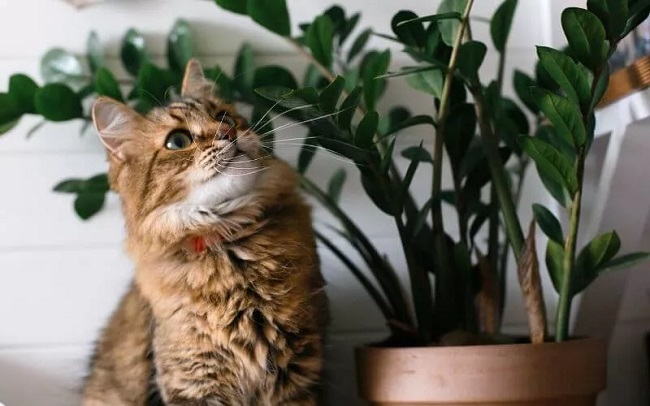The ZZ Plant, or Zamioculcas Zamiifolia, is an attractive and hardy houseplant that requires minimal care.
However, if you share your home with feline companions, it’s crucial to understand the potential risks associated with various houseplants.
One question many cat owners ask is, “Are ZZ Plants toxic to cats?” This article aims to shed light on this topic, detailing the ZZ plant’s toxicity and the steps cat owners can take to ensure their pets’ safety.

ZZ Plants: Understanding Their Toxicity
ZZ Plants are indeed toxic to cats. This is due to their high concentration of calcium oxalate crystals, a substance found in various houseplants.
Read Also:
When ingested or even touched, this compound can cause irritation in cats, leading to various symptoms.
Symptoms of ZZ Plant Poisoning in Cats
Recognizing the signs of ZZ plant poisoning can help ensure your cat gets timely veterinary care.
Common Symptoms
Symptoms can vary based on the amount ingested or the duration of skin contact, but common signs include:
- Excessive drooling
- Vomiting
- Decreased appetite
- Difficulty swallowing
- Oral irritation, visible as redness, swelling, or pawing at the mouth
In severe cases, your cat may exhibit signs of respiratory distress or gastrointestinal upset.
What to Do If Your Cat Ingests a ZZ Plant?
If you suspect your cat has ingested part of a ZZ plant or is showing signs of poisoning, it’s important to take immediate action.
Immediate Steps
Remove your cat from the area: Prevent further ingestion or contact with the plant.
Examine your cat: Look for visible signs of irritation or discomfort.
Contact your vet or local animal poison control center: They can provide guidance on the next steps, which may include bringing your cat in for treatment.
Preventing ZZ Plant Toxicity: Safety Tips for Cat Owners
Protecting your feline companions from potential harm due to toxic plants involves being proactive about your indoor and outdoor plant choices.
Be Aware and Informed
Research plants before bringing them into your home. Several resources, including the ASPCA’s extensive list of toxic and non-toxic plants, can help identify safe plants for homes with cats.
Create a Safe Space
If you already own a ZZ plant, consider keeping it in a room that your cat cannot access, or placing it on a high shelf out of your cat’s reach.
Educate Others
Ensure that everyone in your household understands the risk and knows to keep cats away from the plant.
Alternate Safe Houseplants for Cat Owners
As a cat owner, it’s vital to create a safe environment that includes pet-friendly vegetation. Despite the ZZ plant’s toxicity, numerous other attractive houseplants are safe for cats.
Spider Plant (Chlorophytum Comosum)
Spider plants are an excellent choice for cat-friendly households. They are non-toxic to cats and dogs, easy to care for, and can thrive in various light conditions.
Areca Palm (Dypsis Lutescens)
Also known as the butterfly palm, this plant is a great choice if you want to add a tropical touch to your home. It’s entirely safe for cats and dogs and also helps improve indoor air quality.
Boston Fern (Nephrolepis Exaltata)
Boston Ferns are non-toxic to both cats and dogs. They prefer a cool environment with high humidity and indirect light, making them perfect for bathrooms or kitchens.
Regular Check-ups for Your Cat
Even if you’re cautious about the plants you bring into your home, regular vet check-ups are crucial to maintaining your cat’s health. Regular examinations can help catch any health issues—whether related to plant toxicity or not—at an early stage.
Importance of Regular Vet Visits
Your vet can provide personalized advice on keeping your pet healthy, based on factors like your cat’s age, breed, health status, and lifestyle. Regular vet visits can include routine vaccinations, preventive treatments for parasites, and dental check-ups.
Recognizing Changes in Your Cat’s Behavior
Regular check-ups will also make you more attuned to your cat’s normal behavior, making it easier to notice any changes.
Changes in behavior, such as eating less, changes in stool, or displaying signs of distress, could indicate a health problem and should prompt a visit to the vet.
Read Also:
Conclusion
Yes, ZZ plants are toxic to cats due to the calcium oxalate crystals they contain. While they make an attractive addition to any indoor space, it’s crucial to consider the potential risks if you have cats.
Awareness of the symptoms of plant toxicity, prompt action if exposure occurs, and preventive measures can help ensure the safety of your feline friends. If you’re a cat owner, always do thorough research before bringing any new plant into your home.
























